
From The Press Box To The Owner’s Box: Kari Ellsworth’s Journalism And Hockey Management Career
The following appears in the April issue of Alaska Sporting Journal:

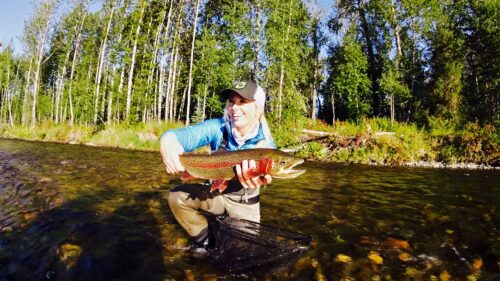
BY TIFFANY HERRINGTON
Kari Ellsworth has worn many hats in her career – from inspiring TV audiences as a sports anchor to co-owning Anchorage’s beloved junior hockey team, the Wolverines.
Known by many Alaskans as Kari Bustamante during her time on KTUU, she charmed viewers with her weekly fishing reports and passion for local sports. Her career has been a vibrant journey through Alaska’s unique cultural landscape, seamlessly blending a love for the outdoors with a drive to build community.
Whether she was casting a line on the Kenai River or cheering on athletes at Anchorage’s Sullivan Arena, Kari’s work has always reflected a deep connection to the people and places of her home state. Now, as a co-owner of the North American Hockey League’s Wolverines, she’s bringing that same passion to a new arena – literally and figuratively.
Ellsworth’s career reflects her deep connection to Alaska and its communities, and that spirit shines through in Hockeytown, a documentary chronicling the Anchorage Wolverines’ first season. (The team will finish the 2024-25 regular season this month, then likely head to the playoffs.) The film tells the story of a city rediscovering its hockey heartbeat through the creation of a team built from scratch. Despite a rocky start, the Wolverines grew into something extraordinary, with young, inexperienced players developing into a team that made an unexpected run to the NAHL championship series.
“I still watch the film and think it’s scripted; it was almost surreal living it,” Ellsworth says. Submitted to film festivals across the U.S. and Canada, Hockeytown captures not just a season but the resilience and magic of a team and its city.
I recently chatted with Kari about her evolution from a young athlete to a broadcast journalist and now to a sports team owner, as well as the lessons and moments that have defined her path.
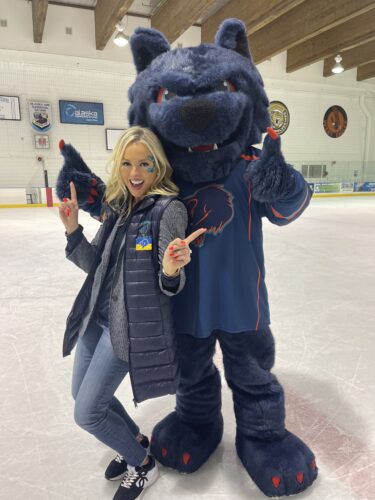
Tiffany Herrington What inspired you to pursue a career in TV sports anchoring, and how did your journey unfold?
Kari Ellsworth My path to sportscasting was anything but traditional. Growing up, I played almost every sport imaginable and loved attending UAA hockey and basketball games with my family. At the time, women in sportscasting roles were rare, so it never even occurred to me as a career option. I was initially pursuing a prelaw degree when I returned to Alaska and decided to take some media courses to get ahead. That’s when I met Joy Mapaye, a former KTUU reporter who had transitioned to teaching at UAA. She became my mentor, encouraged me to transfer to UAA and guided me into broadcast journalism. From there, everything fell into place.
TH You were well-known for your weekly fishing reports. What drew you to that role, and what did you enjoy most about sharing it with the community?
KE Growing up fishing the Kenai River with my family, I never imagined it would become more than a hobby. Reporting on fishing gave me the chance to explore new waters and types of fishing I hadn’t experienced before. While I could talk endlessly about the incredible scenery and trophy catches, the most meaningful moments were connecting with viewers. One memory that stands out is a disabled veteran who approached me in Soldotna. He told me, “You take me out on the river every week,” even though he couldn’t fish anymore. That kind of impact was incredibly humbling. Hearing stories of daughters asking their dads to take them fishing after watching the report is what made it all worthwhile.
TH Do you have any personal fishing stories that stand out?
KE One trip with my dad on the Kenai River is especially memorable. At the time, I had low expectations and treated the trip more as a boat ride and picnic. Ironically, that’s when we became “The Boat” – catching silver salmon one after another while others struggled. The river was packed, and you could feel the envious stares from nearby boats. It was one of those rare, magical days on the water.
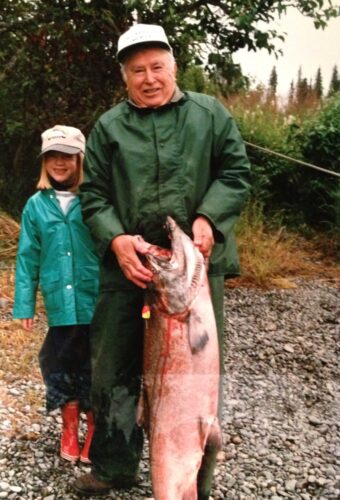
TH How did you transition from TV news to becoming a co-owner of the Anchorage Wolverines?
KE My career in TV news always had an expiration date. While it was a fantastic starting point, I knew I’d eventually move on. When the opportunity with the Wolverines came up, it felt like a natural fit. I spent countless hours at the Sullivan Arena growing up, so stepping into this role felt like coming full circle. Launching the Wolverines was uncharted territory, and it’s been a constant learning experience. But the timing was perfect, and I’m grateful for the opportunity.
TH What has been the most rewarding part of your involvement with the Wolverines?
KE The community, hands down. It’s the same reason I loved my work with KTUU and the fishing reports. Watching kids come to games dressed as their favorite players, ecstatic over every goal, reminds me of my own childhood. I’ve also had meaningful reunions, like reconnecting with a former Alaska Aces [a professional hockey team that was based in Anchorage before relocating to Portland, Maine, after the 2017 season] season ticket holder I interviewed during their final game. She’s now a Wolverines season ticket holder, and seeing her passion continue has been incredibly rewarding.
TH What challenges have you faced as a co-owner of a junior hockey team, and how have you navigated them?
KE The Anchorage sports landscape can be tough, and retaining fans is always a challenge. But with the Wolverines, we’ve created something that feels like family. Starting at Ben Boeke Arena allowed us to build a close-knit community with everyone pitching in. Now that we’ve moved to Sullivan Arena, that sense of family has only grown. It’s not just about wins and losses; it’s about being part of something bigger that supports the city. Sports give Anchorage a heartbeat, and I think the Wolverines embody that.
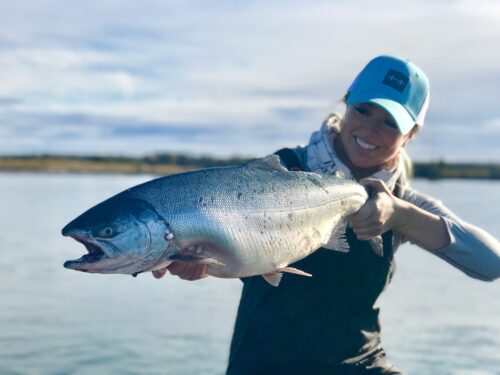
TH How do the Wolverines inspire young athletes and the broader community?
KE Kids need heroes, and they’re not always on the ice. Some dream of being Zamboni drivers, sports marketers or even our mascot, Wiley the Wolverine. We make those dreams accessible and exciting. During our first year, I mentored six young women aspiring to be sports broadcasters and marketers, ranging in age from 8 to 18. By the end of the season, they could practically do my job. Moments like that are what make it all worthwhile.
TH What role do you think local sports teams play in building community in Alaska?
KE Local teams like the Wolverines bring people together in ways that go beyond sports. During our first season, I collaborated with filmmaker Kyle Aramburo to document the Wolverines’ journey. The resulting film, Hockeytown, premiered at the Anchorage International Film Festival and won the Audience Award for Best Documentary Feature. Watching that first season play out on screen reminded me that it’s not about being the biggest or the most talented; it’s about showing up for your team and your community. That’s what the Wolverines represent.
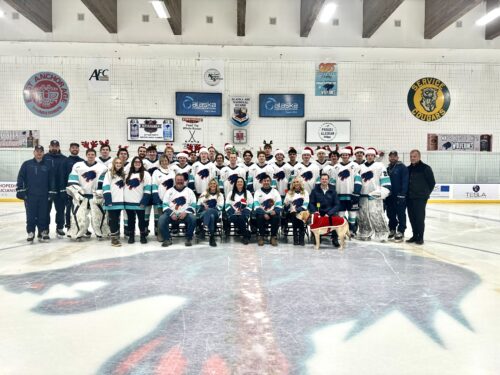
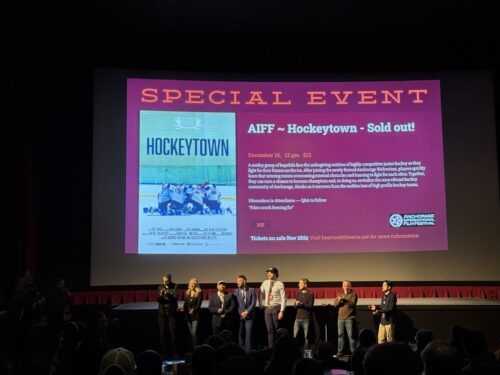
TH How has Alaska’s unique sports culture influenced your work with the Wolverines?
KE Alaska’s sports scene is unlike anywhere else. The geographical challenges alone make it special. We cover travel costs to bring out-of-state teams to Anchorage, something that would be unthinkable in other leagues. The community’s support has been crucial in making that possible. My goal has always been to create opportunities for local athletes. Seeing kids who I used to make recruiting tapes for now playing for the Wolverines and getting the exposure they need to pursue their dreams has been incredibly fulfilling.

TH What are your goals for the Wolverines and your career moving forward?
KE My primary goal for the Wolverines is longevity. I want the team to be around for generations and continue making a positive impact. For example, our first jersey auction of the season raised over $70,000 for the USO of Alaska. As long as we’re here, we can keep supporting local programs.
Personally, I’m focusing on submitting our documentary to film festivals across the country. It took four years to complete, but the lessons and message extend far beyond hockey. I’m excited to see where this next chapter takes me. ASJ
Editor’s note: For more on the film and screenings, see hockeytown-film.com. For more about the Anchorage Wolverines, go to anchoragewolverines.com. Author Tiffany Herrington is a writer based near Seattle.




